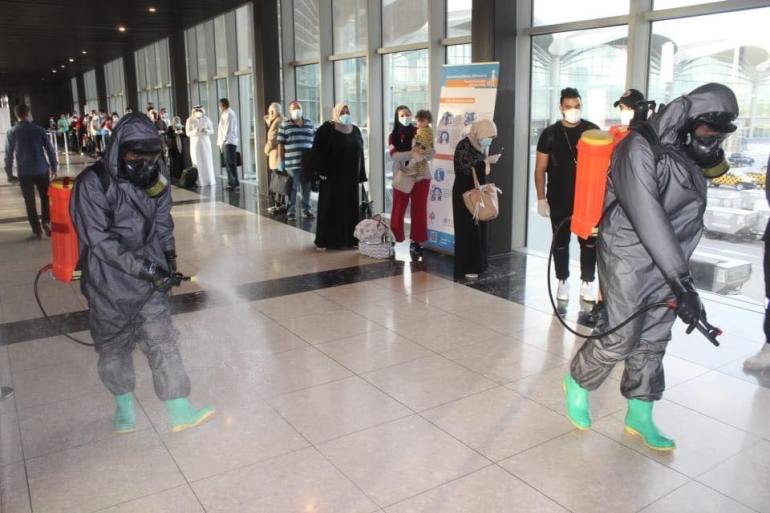Between the repercussions of the Corona pandemic crisis and the economic crisis in the Gulf states, the Jordanian authorities fear a reverse migration of Jordanian workers from the Gulf countries to Jordan because of the loss of these workers' jobs.
The reverse migration of Jordanian labor started two years ago, and this migration would increase the already high unemployment rate in the Kingdom that exceeds 19.5%, in addition to the decrease in the value of financial transfers that supply the Jordanian treasury with funds estimated during 2019 by 2.6 billion dinars (3.7 billion dollars).
The Kingdom fears that the scenario of returning Jordanian expatriates in large numbers, as happened in 1990 during the Iraqi invasion of Kuwait, and the resultant return of tens of thousands of Jordanians from the Gulf countries.
The beginning of the crisis
The reverse migration crisis represented by the return of Jordanian workers from the Gulf states to Jordan started in 2018 after the Saudi authorities imposed in July 2017 fees for every companion in the expatriate family, at a value of 100 riyals per month, which increases 100 riyals each year.
This reflected negatively on the Jordanian workers there, which led to the return of about 5,200 Jordanian engineers during the year 2018 out of 14,000 engineers in Saudi Arabia, according to a study by the Jordanian Engineers Syndicate, which was reviewed by Al-Jazeera Net, in addition to thousands of teachers who work in the private sector, according to Teachers Syndicate.
The numbers speak
In terms of numbers, the remittances of Jordanian expatriates abroad recorded a noticeable decline during the first third of this year, amounting to 51 million dinars ($ 71 million), a decrease of 5.9% compared to the same period in 2019.
According to the statistics of the Central Bank of Jordan, remittances of expatriates amounted to 800 million dinars (1.12 billion dollars) in the first third of the current year 2020, while the value of remittances for the same period last year amounted to 851 million dinars (1.2 billion dollars).
According to Central Bank Governor Ziyad Fariz, remittances abroad represent one of the most important external financial flows to Jordan, and sometimes outperformed the value of official aid and direct investment flows.
Limited options for returnees
The options for returnees are almost limited. Public sector employees on leave without pay will cut their leave and return to their jobs, and some of them will establish their own economic project. As for the rest of the returnees, they will join the queue of job seekers.
The Ministry of Labor provides job seekers and job seekers in the private sector with the opportunity to "link with employers" through the "log" platform.
The Minister of Labor, Nidal Al-Batayneh, told Al Jazeera Net that the ministry is working to link employers to job seekers and job seekers through operating directorates and the electronic "log" platform, in addition to coordination with the Investment Promotion Authority to open investment opportunities among those wishing to invest in any of the economic fields.
Al Batayneh indicated that the Ministry is helping to support small and medium enterprises through loan funds.
Lay off and escape
The reasons for the return of workers in the Gulf are numerous. The engineer Ahmed Tarawneh worked in Saudi Arabia for a period of 10 years, but he left after he was discharged from his work according to his talk to Al Jazeera Net. Jordan and the search for a new job.
As for the teacher Abdullah Al-Abadi, he left Saudi Arabia voluntarily, after imposing high fees on the residence of the expatriates and their families according to his talk to Al-Jazeera Net, while the university professor Muhammad Melhem left Saudi Arabia in the middle of last year for fear of being arrested by the Saudi security services after the arrest of colleagues at the university.
The economic situation in the Emirates is not better than in Saudi Arabia, as former employee of the Abu Dhabi government, Mohamed Al-Balawi, told Al-Jazeera Net that he had finished his work there after reducing his salary by 40% in mid-2019 and canceling other allowances, adding that he intends to create his own project.
The next most difficult
Labor expert Ahmed Awad told Al-Jazeera Net that the coming months - especially the last quarter of this year - bear the worst of Jordanian labor in the Gulf. The Corona crisis and its consequences and the economic crisis in the Gulf countries are deepening, and this will be at the expense of Jordanian labor there.
He added, "We are facing a new crisis by laying off Jordanian workers in the Gulf to add to the existing crises, and unfortunately solutions are lacking for the government." He said that those coming from the Gulf will join about 150,000 workers in the private sector who have been laid off in the Kingdom, which complicates matters further.

